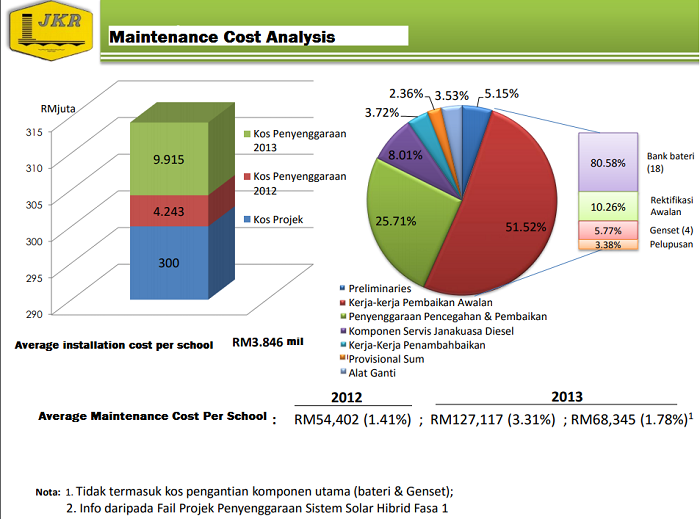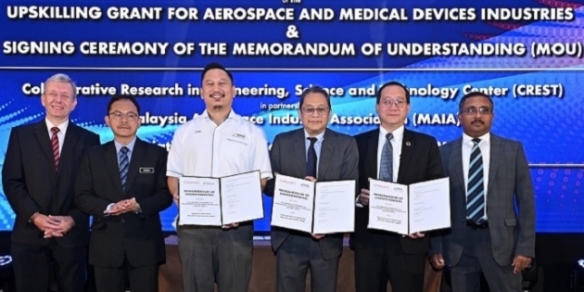Gabriel Walter stands his ground, sues MOE for US$1.86 bil, claims wrongful termination attempt of solar hybrid project
By Karamjit Singh November 11, 2019
- Project was anchor for US$580mil IPO set for 2020 but in doubt now
- Use Sarawak as R&D lab to perfect rural electrification system for global market

“They think I am some rural kid without the ability to fight back,” says Dr Gabriel Walter, a Malaysian scientist turned entrepreneur, on the abrupt termination attempt of Jepak Holdings Sdn Bhd’s three year US$290 million (RM1.2 billion) project by the Ministry of Education (MOE), to deliver a hybrid solar and diesel power system to 369 rural schools in Sarawak that started in Jan 2017.
Citing unfair dismissal Gabriel has filed a US$1.86 billion (RM7.83 billion) writ of summons against the dismissal on Nov 1 in the High Court of Sarawak, which on Nov 6 delivered an interim ex-parte injunction in his favor that among others prevents the MOE from using any of the data or design improvements for the Solar Diesel Hybrid project without permission. 20th November has been set for the inter partes hearing.
“Rural kid” was an off the cuff remark by the frustrated Gabriel, but yet deeply personal. Gabriel, a member of an ethnic Sarawakian tribe, was a rural kid himself, walking to school in the Bario district of Sarawak, almost 4 decades ago as a 6-year old. His mother subsequently transferred him to an urban school within the year, but the memory stuck with him and makes delivering this project, that will impact 30,000 rural Sarawakian school kids, a deeply personal mission for him.
That rural kid today is founder and CEO of Quantum Electro Opto Systems Sdn Bhd (QEOS) which he established in 2008, returning from the United States where as a Senior Research Scientist at the University of Ilinois, he was part of a leading research team working on transistor laser technology for datacom and telecom applications. Up until recently, he was still involved with the university as an Adjunct Assistant Professor in Electrical and Computer Engineering.
But sentiments aside, the hardened entrepreneur in him (he ruefully admits he is not a scientist anymore, not able to spend any time in a lab) also recognises that delivering on the hybrid solar and diesel project, will give him a great story that proves QEOS’ technical capabilities to deliver rural electrification to a global market where around 1.2 billion rural people are still without electricity. According to the Alliance for Rural Electrification, 88% of them live in Sub-Saharan Africa and Southeast Asia.
It was this vision that drove Gabriel to take the huge risk of taking over from the previous shareholders of Jepak this past May in the hopes that having a new shareholder that is a proven and credible technology company, with over 50 patents in its portfolio, would help him overcome the toxic clouds over the direct negotiated contract in late 2016 and supposed intervention by former Malaysian Prime Minister Najib Razak instructing MOE to hand the contract to Jepak. This allegation came out in a Sarawak Report article in June 2018. Those clouds then got darker when a new secretary-general, Dr Mohd Gazali Abas, was appointed to head the MOE, also in June 2018.
“All official phone conversations and face to face meetings just stopped cold while emails were only selectively replied to and messaging became very sporadic,” says Gabriel. Adding to the stress of this was that Jepak was still contractually bound to deliver diesel and maintain the diesel gen sets or risk facing a RM1.4 million LAD (Liquidation Award Damages and performance based deductibles) penalty a day. It has just finished its contractual obligations on the diesel portion of the project but has not been paid by the MOE for 21 months, with the government now owing Jepak RM340 million for the diesel work done.
[RM1 = US$0.24]
Despite the pain of this, having this contract in hand has allowed Gabriel to both borrow money from both banks and creditors and to set in motion the wheels for an IPO that is slated for Feb 2020 where he is hoping to raise RM480 million in cash for the IPO valued at RM2.4 billion.
But those plans are now crushed thanks to what he feels are the uncalled for, unilateral action by the MOE. Gabriel contends that giving this contract to someone who sees the over 20% profit margin as an end to itself is a huge wasted opportunity as opposed to having a technology entrepreneur like him taking this project and leveraging Sarawak as a huge R&D lab to perfect a rural electrification system based on solar diesel hybrid system that can then be exported globally. “It gives us a great story to build on.”
Indeed for the IPO, QEOS, as the holding company of Jepak, is able to leverage the project profits over two years and get a PE of 15x for its listing. But all that is gone now until the matter is resolved in court.
Bringing yearly cost of diesel down from RM300mil to RM50mil
Gabriel had been involved in helping Jepak from a technical standpoint with the project and says that his involvement, limited as it was, made his realise something. “I knew that the way the media was portraying the deal was not how it actually was,” he says.
For example, the accusations that MOE was instructed to give Jepak the contract in late 2016 is totally ignorant of the fact that Jepak had already received a Letter of Award from the MOE in Nov 2016 with Jepak’s first proposal for the project submitted back in 2014.
Jepak followed up on its initial submission with a second, enhanced proposal in 2015 after it worked with a Universiti Teknologi Malaysia (UTM) professor to design a better system for the project. This was when Gabriel first got involved in the project but from the solar aspect.
The final contract was actually signed on 20 June 2017 and proved to be a robust contract, says Gabriel, with the MOE ensuring the 369 schools would get a good system that ensures they have electricity to meet their needs and delivered at a cheaper rate than similar hybrid systems.
As to how the Sarawak solar diesel hybrid project actually started in 2014, Gabriel reveals that the previous directors of Jepak were inspired by a similar project that was already carried out in neighbouring Sabah, itself a large state with a mainly rural population.
.png)

The above two infographics show a post audit analysis by JKR (Road Works Department) in Feb 2015 of the impact of the Sabah solar diesel hybrid project. Starting as early as 2007, Sabah covered 162 rural schools by 2012 at a cost of RM671 million, which works out to an average installation cost of RM3.8 million per school and an average cost of RM189,000 per kW (kilo watt) in 2007 and lower at RM110,000 in 2012.
Compare this to the Jepak contract with RM754 million to be paid for the solar portion in return for generating a cumulative 11,070 kW. That works out to RM68,000 per kW. Gabriel is quick to point out that a big reason for the lower price is also because the price of solar system components, starting with the solar panels was cheaper in 2016 versus in 2007 when Sabah first rolled out its project.
But another critical component is the system design that took QEOS more than a year to design based on actual data gathered from the Rural Sarawak Schools. QEOS is able to deliver a superior hybrid system based on lithium batteries, which last 4 times longer than what is being used, at no additional charge to the government.
He estimates the solar hybrid system QEOS has designed will bring the yearly energy costs for these schools down from RM300 million a year to RM50 million a year. And more importantly, it will give the government a template by which it can then deliver electricity at a much more cost effective way to the rest of Sarawak.
Another point Gabriel knew about Jepak was that it already was one of the contractors providing diesel and maintaining the diesel gen sets to some of the rural schools in Sarawak. It was not coming into the project cold and clueless, intent on grabbing a sweet deal for itself while clueless about the situation on the ground as some of the media coverage has implied.
Taking on the diesel mafia
Gabriel isn’t just taking on the politics around the project. He is also aiming at a long time scam that is going on around the selling of subsidised diesel in rural Sarawak. “The diesel mafia,” he calls it. With the vast landmass of Sarawak, the state makes up almost 34% of Malaysia’s total landmass, diesel costs twice as much in rural areas in Sarawak. This has created a strong incentive for pilfering government provided diesel.
Gabriel even has a recording of a voice message from an individual asking for 3,000 litres of diesel sent to the school, even though it was school holidays. The said individual explained that he planned to sell a certain portion of the supply. The brazenness of what’s going on greatly offends Gabriel who says the people of Sarawak suffer and the federal government is losing a lot of money as well.
Despite the compelling reasons to take over Jepak, “a lot of people have told me that it was a crazy deal to make, and I will look like a fool if this falls apart,” Gabriel acknowledges. “But then heroes are made by the path they choose, and for us [QEOS], we knew what was right, and this project is important for Sarawak.”
Gabriel is not just talking about the 30,000 school kids but also the 2,000 villages in Sarawak that still do not have electricity. Electrification in the state is going slowly because it is so challenging and expensive.
“But we have an opportunity here to show the world how a Macro Micro IPP (independent power producer) system can work.” He aims to connect each of the schools wirelessly into a macro grid system, observing consumption habits and generation of power and helping plan which areas need more power delivered in the future. QEOS is able to deliver this superior hybrid system based on lithium batteries, which last 4 times longer than what is being used, at no additional charge to the government.
This system that he is ready to deploy for the solar portion of the project can become the model for rolling out electricity to the 2,000 villages without electricity in Sarawak who will finally enjoy stable and reliable electricity supply with the rollout saving the government billions. “But this termination attempt wipes out this opportunity.”
His hope now is not that he wins the suit and gets compensation but that the MOE withdraws its termination attempt so that Jepak can move forward and deliver its responsibility while creating the story that Gabriel needs, to take QEOS’ solution to the global market.
Related Stories :


